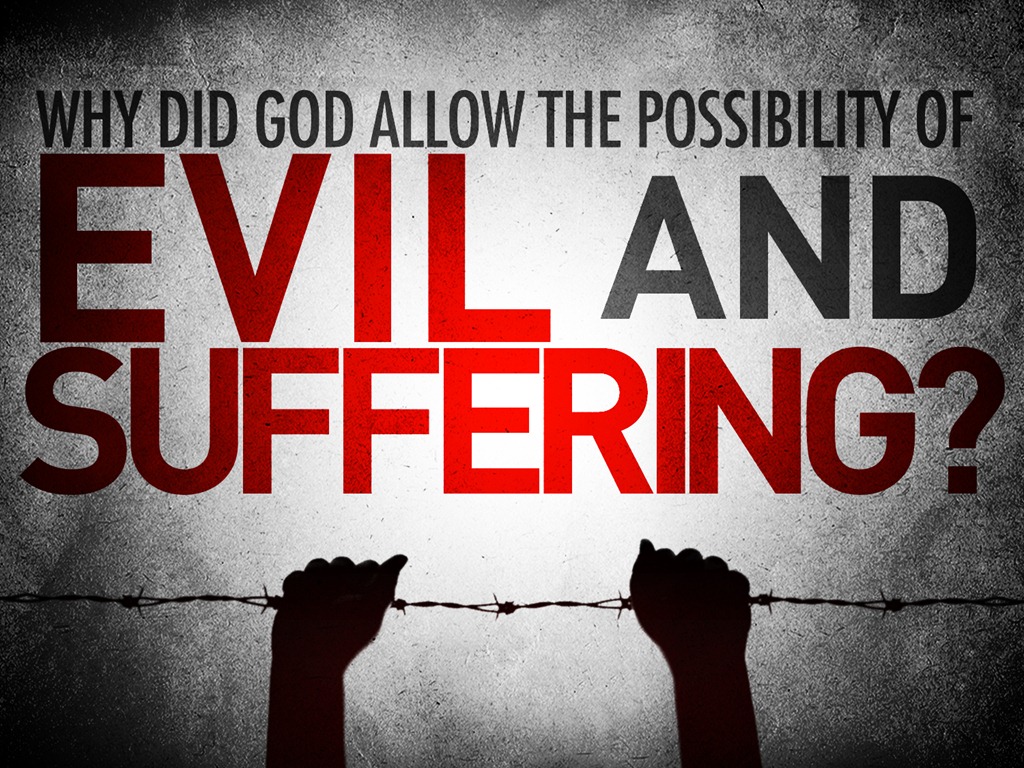
Romans 8:18-20 "For I consider that the sufferings of this present time are not worthy to be compared with the glory that is to be revealed to us. 19 For the anxious longing of the creation waits eagerly for the revealing of the sons of God. 20 For the creation was subjected to futility, not willingly, but because of Him who subjected it, in hope."
Introduction:
It always amazes me the range of questions people ask me from time to time. Some of the most penetrating questions derive from children. One young lady in our church recently asked me the question about whether God knew about the fall of Adam and Eve before He created them. Her concern was that if God knew such a fact, why then did He create Adam and Eve? Such questions touch upon a much discussed topic among thinkers that we call “the problem of pain” or “the problem of evil and suffering”. In today’s post, we want to see what scripture has to say to us about this question and the relationship between God’s plans and purposes for creating a world that included free-will beings such as ourselves, His allowance for evil in our world and His plan for bring about a solution to it.
God did know that the fall was going to happen, and yet remained Sovereign
In Romans 8:18-25, we find what is perhaps the clearest statement in scripture regarding the relationship between God's Sovereignty, the reality of evil in our world and His purposes for allowing such. Romans 8:18 begins with a blanket statement from Paul regarding his approach to this issue: "For I consider that the sufferings of this present time are not worthy to be compared with the glory that is to be revealed to us."
Paul does not skirt the issue of evil and suffering, but rather indicates that it is included in God's purposes. We then see this statement in Romans 8:19-20 "For the anxious longing of the creation waits eagerly for the revealing of the sons of God. 20 For the creation was subjected to futility, not willingly, but because of Him who subjected it, in hope."
The reader can note the underlined portion of Romans 8:20. When I first read what Paul writes in Romans 8:20 (namely: "because of Him who subjected it, in hope"), I found the clause to be quite startling. God is depicted as somehow including not just the possibility, but the actuality of the intrusion and entrance of sin into our world. With that fact acknowledged, God's willing of our world and His choice to permit evil and suffering as so perpetrated by free-moral agents takes nothing away from the fact that God is Sovereign. Psalm 103:19 defines for us God's Sovereignty: "The Lord has established His throne in the heavens, And His sovereignty rules over all."
In the next post, we will introduce the reader to some terms that can aid us in walking through the Bible's revelation of God's Sovereignty, the reality of evil and the reality of human responsibility.
The Bible never dodges this subject of the fall, pain and suffering and God's Sovereignty in the midst of it all. Romans 8:22-23 describes the presence of evil and suffering in our world as "groaning" and "pain": "For we know that the whole creation groans and suffers the pains of childbirth together until now. 23 And not only this, but also we ourselves, having the first fruits of the Spirit, even we ourselves groan within ourselves, waiting eagerly for our adoption as sons, the redemption of our body."
Conclusions for today:
In short, God did know that in His purposes and plans for creating our world, the realities of evil, suffering and human responsibility would be included.1
Endnotes:
1. To deny God's omniscience and decision to permit such details leads to a disastrous alternative: that evil and suffering were accidents, and that the cross of Christ was God's "plan-b" as it were. Thus, God's choice (or decree) to create this version of history included the fall, the cross of Christ and those persons who would choose Him by grace and those who would freely reject Him by by-passing God's overtures of grace to them.
God's omniscience is defined as His knowledge of all the information contents of true statements and sentences that describe a given version of reality (also called "propositions"). For example, if I would choose to eat cereal for breakfast or a pop-tart, either choice could be freely made by me. God in His omniscience, and particularly His natural knowledge, knew before-hand every possible history, including those in which I eat cereal or a pop-tart. If I eat the cereal, then God already knew I would do so, and thus I would be the one eating it.
However, if I decide on a pop-tart instead, again God knew what I would do, since my eating a pop-tart can be true or my eating cereal can be true. Either way, God knew all the possibilities, brought into being the particular version of history He wanted to before it happened, and included my ability to choose in the carrying forth of His ultimate ends.
This aspect of God's omniscience, whereby He knew of every possible version of history or "world" is what theologians call God's "natural knowledge" (see Psalm 139:1-6; Psalm 145; Romans 11:33-36). God's "knowledge" of the future can be best described as part of the concepts He possessed in His mind from all eternity. As God knew of the future before it happened, He then made a decision or a decree to bring about that version of history that was most feasible and suitable in accomplishing His most-wise ends (what theologians call God's "free-knowledge"). God's free-knowledge, whereby He freely-chose to create this version of history, including the detail of human beings endowed with freedom of the will, means that His Sovereign decree does in no-way eliminate what are genuine human choices.
